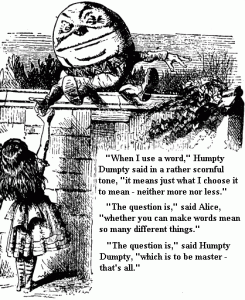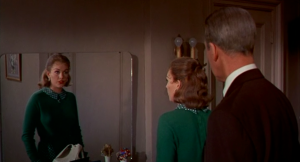For some reason, I found the Humpty Dumpty/egg motif in City of Glass really interesting. At first I thought it was just a humorous idea put in to make Peter Stillman Sr sound even crazier, but the egg motif continues to reoccur after that, and as was brought up in seminar Humpty Dumpty himself shows up frequently in panels towards the end of the graphic novel. In the novel, Peter Stillman Sr calls Humpty Dumpty “the purest embodiment of the human condition” while he is describing his theories to Quinn, making the connection that humans, like eggs, have not yet reached their full potential (Auster 127). Stillman calls him a “philosopher of language”, quoting a passage from Through the Looking Glass,

Humpty Dumpty page from Lewis Carol’s “Through the Looking Glass”
“‘When I use a word, Humpty Dumpty said, in rather a scornful tone, it means just what I choose it to mean – neither more nor less. The question is, said Alice, whether you can make words mean so many different things. The question is, said Humpty Dumpty, which is to be master – that’s all.’“ (Lewis Carrol as qtd by Auster 127). Throughout the rest of this chapter and the next, Quinn makes many other comments relating to eggs – “you can’t make an omelette without cracking a few eggs” (150) – even going so far as writing a list of all the egg-related phrases he can think of in his red notebook (197). The more the Humpty Dumpty and eggs get referenced by Quinn, the less clear their meaning becomes to the reader. In the graphic novel, however, Humpty Dumpty takes on a second layer of meaning in that its recurring presence almost seems to be taunting Quinn with the memory of his late son. Considering this, I decided to do my own detective work and see if there were any other meanings to be found in the use of Humpty Dumpty and eggs in the novel.
The origins of “Humpty Dumpty” as a nursery rhyme are hard to place and with a quick Google search I ran into multiple theories. Some say that the character of Humpty Dumpty was a reference to King Charles I and his great fall from power leading to his execution. Others argue that Humpty Dumpty refers to a large cannon used in a civil war in England that caused the wall of St Mary’s Church to fall down during battle. It wasn’t until Lewis Carrol’s novel Through the Looking Glass that Humpty Dumpty was depicted as an egg. Peter Stillman Sr theorizes that Humpty Dumpty “sketches the future of human hopes and gives clues to our salvation: to become masters of the words we speak, to make language answer our needs” and goes on to say that “all men are eggs … we exist, but we have not yet achieved the form that is our destiny” (128). Further, he says that men are fallen creatures as is illustrated in the book of Genesis, and Humpty Dumpty has also fallen. Then there is the story of Columbus’s egg – “when faced with the problem of how to stand an egg on its end, he merely tapped slightly on the bottom, cracking the shell just enough to create a certain flatness that would support the egg when he removed his hand” (129). According to Stillman, Columbus sought paradise when he discovered the new world of America, and with Stillman’s contributions it will become paradise. Perhaps the phrase “you can’t make an omelette without cracking a few eggs” suggests that humanity can’t reach its full potential without making some sacrifices along the way. Or maybe at this point Quinn cracks.
Either way, the more thought I put into this particular motif the more I realized that it is not the point. “In the good mystery there is nothing wasted, no sentence, no word that is not significant. And even if it is not significant, it has the potential to be – which amounts to the same thing” (15). These details have the potential to be significant, but are not. It turns out that Auster subtly points this out right on the first page – “the question is the story itself, and whether or not it means something is not for the story to tell” (7).

